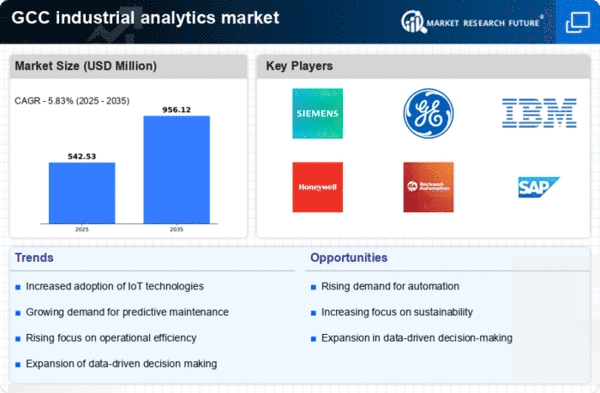Focus on Predictive Maintenance
The emphasis on predictive maintenance is emerging as a crucial driver for the industrial analytics market in the GCC. Companies are increasingly recognizing the value of utilizing analytics to predict equipment failures before they occur, thereby minimizing downtime and maintenance costs. By implementing predictive maintenance strategies, organizations can achieve cost savings of up to 20% on maintenance expenditures. This proactive approach not only enhances operational efficiency but also extends the lifespan of machinery. As industries strive to optimize their operations, the industrial analytics market is likely to expand, driven by the growing adoption of predictive maintenance solutions.
Integration of IoT Technologies
The integration of Internet of Things (IoT) technologies is significantly influencing the industrial analytics market in the GCC. With the proliferation of connected devices, companies are generating vast amounts of data that can be analyzed for actionable insights. This trend is expected to propel the market, as organizations utilize IoT data to monitor equipment performance and predict maintenance needs. It is estimated that the industrial analytics market could see a growth rate of over 25% in the coming years, driven by IoT adoption. The ability to analyze real-time data from IoT devices allows businesses to enhance operational efficiency and reduce downtime, making it a critical driver in the industrial analytics market.
Government Initiatives and Support
Government initiatives aimed at promoting digital transformation are playing a pivotal role in the growth of the industrial analytics market in the GCC. Various national strategies emphasize the importance of adopting advanced technologies to enhance economic diversification and competitiveness. For instance, investments in smart city projects and digital infrastructure are expected to exceed $100 billion in the next decade. Such initiatives create a conducive environment for the adoption of industrial analytics, as businesses are encouraged to innovate and integrate data-driven solutions. The support from government bodies not only facilitates funding but also fosters collaboration between public and private sectors, further propelling the industrial analytics market.
Growing Importance of Data Security
As the industrial analytics market expands in the GCC, the importance of data security is becoming increasingly pronounced. With the rise of data-driven decision-making, organizations are more vulnerable to cyber threats, necessitating robust security measures. Companies are investing in advanced analytics solutions that not only provide insights but also ensure data integrity and protection. It is projected that the market for data security solutions within the industrial analytics sector could grow by 15% annually. This focus on safeguarding sensitive information is essential for maintaining trust and compliance, thereby driving the growth of the industrial analytics market.
Rising Demand for Operational Efficiency
The industrial analytics market is experiencing a notable surge in demand for operational efficiency across various sectors in the GCC. Companies are increasingly leveraging analytics to optimize processes, reduce waste, and enhance productivity. According to recent data, organizations that implement industrial analytics can achieve efficiency improvements of up to 30%. This trend is driven by the need to remain competitive in a rapidly evolving market. As industries face pressure to lower operational costs while maintaining quality, the adoption of analytics tools becomes essential. The industrial analytics market is positioned to grow. Businesses seek to harness data for better decision-making and streamlined operations.
















